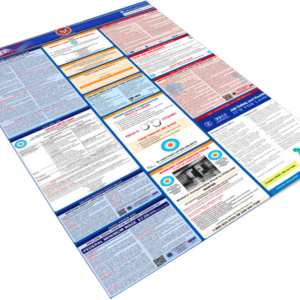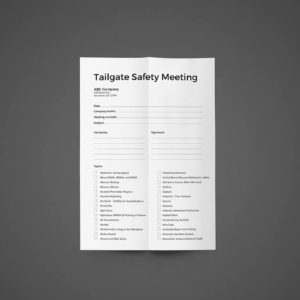Sexual harassment is a very real threat in the workplace. It’s important to remember that even if an employee isn’t intending to harass another employee, the perception of the employee that comments are directed towards is what matters. There are strict guidelines against sexual harassment, and following them can keep employees from making career-damaging mistakes.
This training satisfies the statutory requirements for education on sexual harassment as required by California AB 1825. In doing so, it covers the importance of a harassment free workplace, the legal definitions of harassment, employer obligations, the components of anti-harassment policies, abusive conduct or bullying, retaliation, liability and remedies for harassment under the law, and how to prevent harassment and discrimination in the workplace.
You have 30 days from the purchase date of the course to complete video training.
State by State Harassment Training Requirements
California
- By January 1st, 2021, employers with five or more employees must train all employees and supervisors within six months of their start date, and then retrain every two years.
- Supervisors must complete at least two hours of classroom or other interactive training and education on sexual harassment prevention.
- Nonsupervisory employees must complete at least one hour of classroom or interactive training and education.
- New nonsupervisory employees must be trained within six months of their hire.
- Supervisors must be trained within six months of assuming a supervisory position.
- An employer who has provided this training and education to an employee in 2019 is not required to provide refresher training and education again until two years thereafter.
- Temporary and seasonal employees – or any employee hired to work less than six months – must also be trained within thirty calendar days after their hire date or within 100 hours worked, whichever comes first.
New York State
- By October 9, 2019, all NY employees must complete sexual harassment training, and then be retrained on an annual basis.
- New employees should be trained as soon as possible after their start date.
- All workers must be trained, regardless of immigration status, including part-time, temporary and seasonal workers.
- The training must be interactive, requiring some level of employee participation and may be web-based.
- Employers should provide employees with training in the language spoken by their employees.
- Employers are encouraged (not required) to keep a copy of training records and a signed acknowledgment that employees have read the organization’s sexual harassment prevention policy.
New York City
- New York City employers have additional training requirements under the Stop Sexual Harassment in NYC Act.
- Effective April 1, 2019, employers are required to train their employees annually.
- Employers are encouraged to train new employees as soon as possible.
- Employers must train part-time and temporary employees and independent contractors, who work more than eighty hours in a calendar year and work or at least ninety days.
- Training must cover bystander intervention, the prohibition of retaliation and provide information on the complaint process available through the NYC Commission on Human Rights, the New York State Division of Human Rights and the U.S. Equal Employment Opportunity Commission.
- Employers must keep training records for at least three years, including signed employee acknowledgements, which may be electronic. Records must be available for inspection upon request.
Illinois
- New laws effective January 1, 2020.
- All Illinois employers are required to provide sexual harassment prevention training to all employees on an annual basis.
- New employees must receive sexual harassment training within ninety days of hire.
- Employers must either use the model sexual harassment training program of the Illinois Department of Human Rights or establish training that exceeds the minimum standards provided by the model training.
- Special requirements are in place for restaurants and bars. These include providing employees with sexual harassment prevention training that is tailored to the restaurant and bar industry and a written sexual harassment policy in English and Spanish.
Connecticut
- New laws effective October 1, 2019.
- All Connecticut employers, regardless of size, are now required to provide sexual harassment training to supervisory employees by October 1, 2020, or within six months of an employee assuming a supervisory role.
For employers with 3 or more employees
- Organizations with 3 or more employees must provide two hours of training to all employees.
- For existing employees, this training must be provided by October 1, 2020, and retrained at least every 10 years.
- All employees hired on or after October 1, 2019 must receive the training within six months of hire, and retrained at least every 10 years.
- Anyone who received the two-hour training after Oct. 1, 2018 does not have to be retrained.
- Employers are encouraged to maintain training records for a minimum of one year.
Delaware
- New laws effective January 1, 2019.
- Employers must provide interactive training and education to all employees and supervisors.
- All current employees must be trained by December 31, 2019, and then every two years.
- All new employees hired after January 1, 2019 must be trained within the first year of their start date, and then every two years.
- Supervisors must receive additional training on their responsibilities to prevent and correct sexual harassment and retaliation, and then be retrained every two years.
Maine
- Employers must provide training to all employees within one year of their start date.
- Supervisory and managerial employees must receive additional training within one year of their hire or promotion on their specific responsibilities to address sexual harassment complaints.
- Employers must keep training records for at least three years and must make the records available for inspection upon request.
Rhode Island
- Rhode Island legislation (2019-S 0250) requires that employers with four or more employees conduct sexual harassment training and include retaliation as an unlawful employment practice.
- New employees should be trained within one month of their hire date.











